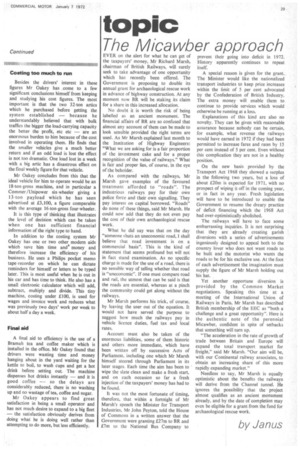topic
Page 31

If you've noticed an error in this article please click here to report it so we can fix it.
The Mica wber approach
EVER on the alert for what he can get of the taxpayers' money, Mr Richard Marsh, chairman of British Railways, will surely seek to take advantage of one opportunity which has recently been offered. The Government is proposing to double its annual grant for archaeological rescue work in advance of highway construction. At any moment now BR will be staking its claim for a share in this increased allocation.
No doubt it is worth the risk of being labelled as an ancient monument. The financial affairs of BR are so confused that almost any account of them can be made to look sensible provided the right terms are used. As Mr Marsh explained last month to the Institution of Highway Engineers: "What we are asking for is a fair proportion of the investment cake and for a proper recognition of the value of railways." What is fair and proper lies, of course, in the eye of the beholder.
As compared with the railways, Mr Marsh gave examples of the favoured treatment afforded to "roads". The industrious railways pay for their own police force and their own signalling. They pay interest on capital borrowed. "Roads" do none of these things, said Mr Marsh. He could now add that they do not even pay the cost of their own archaeological rescue work.
What he did say was that on the day "someone shuts an uneconomic road, I shall believe that road investment is on a commercial basis". This is the kind of statement that seems profound but will not in fact stand examination. As no specific charge is made for the use of a road, there is no sensible way of telling whether that road is "uneconomic". If one must compare road and rail, the utmost that can be said is that the roads are essential, whereas at a pinch the community could get along without the railways.
Mr Marsh performs his trick, of course, by leaving the user out of the equation. It would not have served the purpose to suggest how much the railways pay in vehicle licence duties, fuel tax and local rates.
Account must also be taken of the enormous liabilities, some of them historic and others more immediate, which have been written off by successive Acts of Parliament, including one which Mr Marsh himself steered through Parliament in its later stages. Each time the aim has been to wipe the slate clean and make a fresh start, and on each occasion so far a fresh injection of the taxpayers' money has had to be found.
It was not the most fortunate of timing, therefore, that within a fortnight of Mr Marsh's speech the Minister for Transport Industries, Mr John Peyton, told the House of Commons in a written answer that the Government were granting £27m to BR and £7m to the National Bus Company to prevent their going into deficit in 1972. History apparently continues to repeat itself.
A special reason is given for the grant. The Minister would like the nationalized transport industries to keep price increases within the limit of 5 per cent advocated by the Confederation of British Industry. The extra money will enable them to continue to provide services which would otherwise be running at a loss.
Explanations of this kind are also no novelty. They can be given with reasonable assurance because nobody can be certain, for example, what revenue the railways would have earned in 1972 if they had been permitted to increase fares and rates by 15 per cent instead of 5 per cent. Even without this complication they are not in a healthy position.
On the new basis provided by the Transport Act 1968 they showed a surplus in the following two years, but a loss of about £20m is expected for 1971, with no prospect of wiping it off in the coming year, or in fact in any year. Fresh legislation will have to be introduced to enable the Government to resume the dreary practice of deficit financing which the 1968 Act had over-optimistically abolished.
The railways will have to face some embarrassing inquiries. It is not surprising that they are already creating garish diversions with a series of advertisements ingeniously designed to appeal both to the country lover who does not want roads to be built and the motorist who wants the roads to be for his exclusive use. At the foot of each advertisement the imagination must supply the figure of Mr Marsh holding out his hat.
Yet another opportune diversion is provided by the Common Market negotiations. Speaking this time at a meeting of the International Union of Railways in Paris, Mr Marsh has described British membership of the EEC as "both a challenge and a great opportunity". Here is the authentic note of the perennial Micawber, confident in spite of setbacks that something will turn up.
"The acceleration in the rate of growth of trade between Britain and Europe will expand the total transport market for freight," said Mr Marsh. "Our aim will be, with our Continental railway associates, to obtain an increasing share of this more rapidly expanding market."
Needless to say, Mr Marsh is equally optimistic about the benefits the railways will derive from the Channel tunnel. He ignores the possibility that the project almost qualifies as an ancient monument already, and by the date of completion may even be eligible for a grant from the fund for archaeological rescue work.
by Janus




















































































